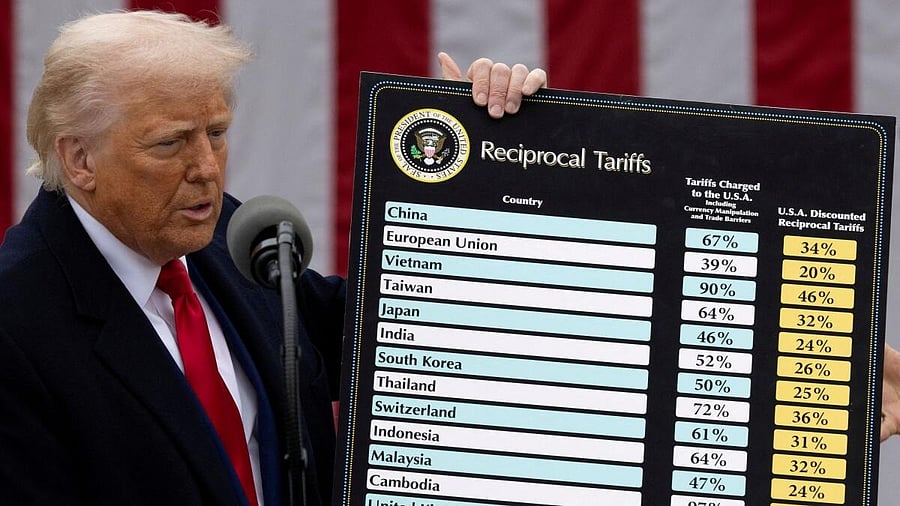
US President Donald Trump delivers remarks on tariffs in the Rose Garden at the White House in Washington, DC.
Credit: Reuters File Photo
By Paul J Davies
President Trump’s mad trade war is all about goods, but financial services are also suffering from the White House’s arbitrary global tariffs. Bank stocks sold off harder than the wider S&P 500 index on Thursday, and that looked like continuing on Friday. The reason is that unless something changes fast, this industry is about to get hit from all sides at once.
For banking, credit card lending, money management and investment banking, Trump’s attempt to take on the world and bully friend and foe alike into reversing their goods trade balances promises to be a nasty mix. Inside the US, it raises the specter of stagflation, the worst possible economic environment for banks because inflation and low growth (or even recession) drive up loan losses. Whatever the Federal Reserve does will be painful for lenders. Maintain high interest rates to tackle the inflationary effect of tariffs, and bad loans will rise rapidly as jobs are lost. Cut rates faster to cope with a worse slowdown — which is what markets are betting on — and interest income gets squeezed faster while credit losses still likely rise.
Lower-income workers and families undoubtedly suffer first and most, so consumer finance company stocks have been among the biggest fallers. Shares in Synchrony Financial were down more than 15 per cent over the week, while American Express Co. and Capital One Financial Corp. were also big losers.
Commercial borrowers big and small across the country will struggle with a pick-and-mix of higher costs, falling profit margins and slower sales. Again, that spells problem loans. Bank of America Corp. and Citigroup Inc. stocks were down about more than 11 per cent each. Citigroup looks worse off because financing global trade is one of its main businesses — nearly half its corporate loan book is to international companies.
Outside of the US, shares of big trade-focused banks also did poorly, with HSBC Holdings Plc and Standard Chartered Plc, both deeply embedded in Asia, getting squished between the belligerence of Trump and China. The former is down 15 per cent and the latter 20 per cent since Wednesday.
There was no respite for investment banks or wealth managers either. Deals and capital markets work has already been a big disappointment this year, and bankers have started to wake up to the reality Trump has created in recent weeks. The president’s shock-and-awe campaign of carpet-tariffing only darkens their outlook further. More stock market declines could halt even initial public offerings that have got quite far down the track. The European buy-now-pay-later lender Klarna Group Plc was meant to list in the US this month — but the sliding dollar and tumbling valuations of financial and technology companies are making its potential proceeds look thinner by the day. I wrote on Friday morning it might need to rethink — and this afternoon it paused its plans, according to the Wall Street Journal.
For US wealth and asset managers, there’s a double threat. Falling markets shrink fund values and so cut management fees, that’s straightforward enough. But also the trade deficit Trump is determined to reverse has an unavoidable reflection in capital inflows. Companies and people that sell into the US have dollar proceeds to invest — and guess what, those dollars find their way back into US financial assets. Stop buying so many goods from abroad and foreigners will stop putting money into US bonds, stocks and private funds. Everyone from Morgan Stanley to KKR & Co. is having their futures diminished by these effects — and their stock prices have joined the slide.
Then, of course, if the trade wars escalate, which seems very much on the cards, then retaliations could easily move beyond into services trade, too. Trump thinks the world has been robbing America blind because of its goods-trade deficit, which was about $1.2 trillion last year. By the same logic, America’s silver-tongued bankers, lawyers and real estate agents have been pick-pocketing the rest of the world for years, generating a surplus last year of about $300 billion. If, through explicit policy or patriotic feeling, companies around the world start eschewing American services, that’s not going to be great for its bankers either.
US financial groups aren’t alone. Banks stocks across the world are getting hammered, particularly those in European nations most exposed to industrial trade — like Deutsche Bank AG of Germany or UniCredit SpA of Italy — or those most focused on international capital flows — such as Barclays Plc in the UK or BNP Paribas SA of France. The saving grace for European bank stocks is that they have been on a tear for some time, which accelerated when Trump won last November’s election. Deutsche Bank might be down 15 per cent in the past two days, but it’s still up more than 20 per cent since Nov. 4.
Maybe the market reactions will encourage Trump to reflect on the wisdom of lobbing cluster bombs into the world economy. Watching the capitalist carnage on Thursday, Trump posted: “I think it’s going very well — the MARKETS are going to BOOM…” In financial businesses across the US and beyond, people are no doubt thinking that they’d hate to see what the plan would look like if it was going badly.